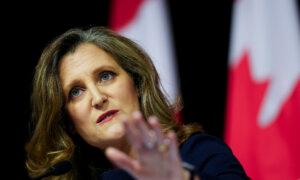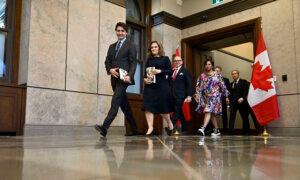Higher taxes for “the very wealthiest” Canadians will help fund big spending in the 2024 federal budget, said Finance Minister Chrystia Freeland when she presented the budget on April 16. But the negative impacts of these higher taxes could affect more than just the wealthiest, some economists say. And the wealthiest may be able to get around the increase, leaving Ottawa with less revenue than expected.
“It’s not just the rich. Many Canadians will be affected,” Jake Fuss, director of fiscal studies at the Fraser Institute think tank, told The Epoch Times.
Some will be affected indirectly, he said, as the proposed higher tax on capital gains, for example, could ripple out into the economy, such as by disincentivizing investment.
Many will also be directly affected, said Mr. Fuss, because it’s not only the wealthiest Canadians who may have large capital gains. The capital gain resulting from the sale of a cottage, a small business, stocks, or some other asset that represents decades of investment would now be taxed at a higher rate for the portion of the gains above $250,000.
Jack Mintz, president’s fellow at the University of Calgary School of Public Policy, noted the same issue.
“People sometimes get significant capital gains in one year, but they really don’t have that much income over the years,” Mr. Mintz told The Epoch Times. And the wealthiest Canadians targeted by the tax could potentially avoid paying, he added.
“I can just see all sorts of ways that people are going to be trying to avoid the higher capital gains tax rate.” For example, he said, people might spread out their gains over time to keep them at or below the annual threshold of $250,000.
Currently, people only pay tax on 50 percent of the total capital gains they earn from selling their assets. Under the new measure, effective June 25, they would still pay tax on just half of their first $250,000 in capital gains, but for any capital gains beyond that threshold, two-thirds would be taxed.
Mr. Fuss said some people might wait to conduct such transactions, hoping a Conservative government will reverse the policy if elected next year.
If Canadians find ways to avoid paying, it could leave a revenue gap in a budget already reliant on borrowing, he said. The budget estimates that this capital gains measure would increase federal revenues by $19.4 billion over five years starting in the current fiscal year, 2024–25.
“If they’re not generating as much revenue as they expect from the capital gains tax rates, that’s simply going to increase our deficits and increase our debt interest costs as well over the long run, which is going to have implications for Canadians,” Mr. Fuss said.
Each Canadian is paying about $1,300 in taxes this year toward debt interest alone, he said. “That’s equivalent to the same amounts of money that the federal government is collecting in the goods and services tax, with GST, this year.”
The government acknowledges in the budget that it’s not only the wealthiest Canadians who benefit from the current 50 percent limit on capital gains taxes. It says, however, that Canada’s “top 1 per cent” tend to earn relatively more income from capital gains. Conversely, only about 5 percent of Canadians under the age of 30 had any capital gains in 2021.
“We are asking the wealthiest Canadians to contribute a bit more, so that we can make investments to ensure a fair chance for every generation,” it says.
Yet all Canadians may be impacted if the higher taxes disincentivize investment, Mr. Fuss and Mr. Mintz both said. “People will invest in other countries instead,” Mr. Fuss said.
The budget’s section on “tax fairness” decries a “global corporate tax race to the bottom” in which “the biggest multinational corporations do not always pay their fair share.”
Investment and innovation are needed to boost productivity—and the budget doesn’t address this key principle underlying Canada’s economic problems, the economists said.
“[The budget] does not address what I think is the number one problem facing Canada, which is our very poor productivity,” Mr. Mintz said.
Productivity the ‘Number One Problem’
Moshe Lander, senior economics lecturer at Concordia University, also highlighted this as a major problem.
“The biggest issue confronting Canada right now ... is lagging productivity,” he told The Epoch Times. “How do we boost productivity in Canada? There’s barely a mention of it in the budget.”
Productivity is the number of goods and services we produce per hour, Mr. Lander said. It’s fundamental to the economy’s health and impacts the standard of living and affordability, he said.
Some mentions of “productivity” in the budget refer to boosting clean energy technology and artificial intelligence. It also says its investments in health care, early learning, child care, newcomer integration, the net-zero transition, and the housing supply “ensure people are healthy and able to contribute to their full potential in the labour force.”
Technology investments don’t necessarily boost productivity, at least not any time soon, Mr. Lander said. It’s hard to predict how they will develop. He gave the example of how it was hard in the 1980s to imagine the novel car phones of the time would morph over 40 years to become today’s smartphone. AI might be useful, or it might go the science-fiction route and “overrides humans,” he said.
Canada needs better competition in its industries to boost productivity, Mr. Lander said. “Canada is awash in non-competitive industries,” he said. “You can almost create an alphabet out of it: airlines, banks, cellphones, farming, grocers, internet service providers, all the way down to telecoms.”
He gave the example of telecommunications and the merger of Rogers and Shaw, completed last year, which reduced the “big four” companies in the industry to the “big three.” The budget could have included legislation to improve competition, he said.
“Productivity falls ... because businesses are not worried about losing their customers.”
Productivity and affordability are intertwined, Mr. Lander said. Prices are high and they’re not going down—slowing inflation means the price of goods won’t rise so rapidly, he said. It doesn’t mean prices will lower or “deflate.” So the only way for things to become more affordable is for wages to rise. And the only way for wages to rise naturally and not cause greater inflation is for productivity to go up, he said.
Mr. Mintz and Mr. Fuss said other ways to boost productivity include lowering taxes and decreasing the regulatory burden on businesses.
Some of the good things the budget does, Mr. Fuss said, include investing in much-needed housing and national defence. He is worried, however, that boosts given to first-time homeowners will increase demand and lead to higher housing prices.
Spending, Debt
Mr. Lander said the government will receive some flack for not prioritizing balancing the budget, but the large numbers need to be put in context. For example, the $54.1 billion to be spent on debt interest in fiscal year 2024–25 is an “eye-watering number” to most Canadians.
“But remember that the Canadian economy is over $2 trillion. And so that number is not that large in the grand scheme,” he said.
Expenses in the budget for this fiscal year total $535 billion, with a deficit of about $40 billion. Ms. Freeland forecasts the budget shortfall will decrease to $20 billion in 2028–29. Ottawa will borrow $508 billion in 2024–25, 83 percent of which will go toward refinancing maturing debt. The budget projects Canada’s federal debt to be over $1.25 trillion this fiscal year.
The Liberals were more vocal about fiscal responsibility when first elected, Mr. Lander said, and now they’re more focused on establishing legacy programs. Nonetheless, the debt-to-GDP ratio, projected to be 41.9 percent in 2024–25, is “rather stable and rather low,” he said.
Mr. Mintz is alarmed by the measure of GDP growth per capita.
While Canada’s governing politicians often use GDP growth as evidence of strong economic performance and successful policy, a recent study by the Fraser Institute says if the cited figures don’t account for population changes, they present a “misleading picture.”
Canada’s real per-person annual GDP growth rate is 0.7 percent from 2000 to 2023—worse than the G7 average of 1 percent and the Americans’ 1.2 percent, the study said.
“We’re looking at the immiseration of Canada, with ... years of negative GDP per capita growth, that’s very serious,” he said. The high government spending is inflationary, he said, “because you’re absorbing more and more resources by the government and not getting much of a private sector going.”














 English (US) ·
English (US) ·  Turkish (TR) ·
Turkish (TR) ·